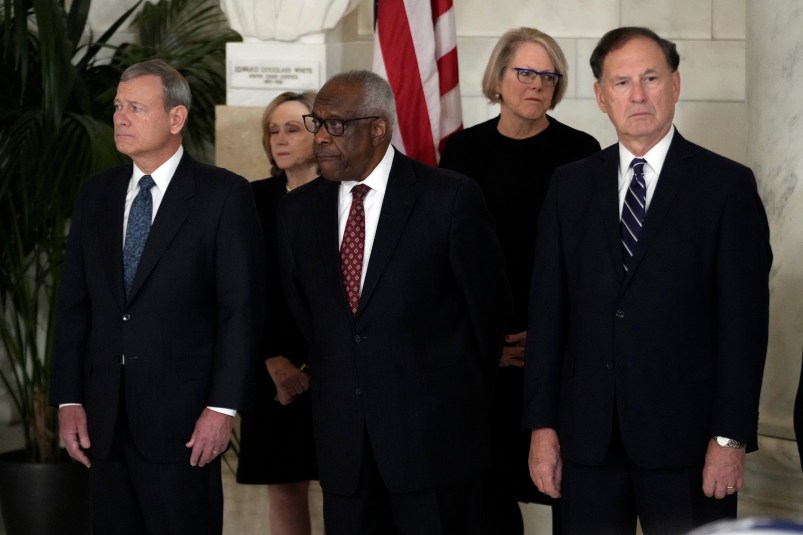Before this morning, the following occurred to <$Ad$>me.
Vice President Cheney has been out of sight for a long time. But of late he’s been out a lot, doing media interviews, giving campaign speeches and so forth.
Isn’t it time someone asked him about the fact that senior members of his staff are at the center of a criminal investigation into the intentional leak of the identity of a clandestine operative at the CIA?
He’s doing a lot of press. Why is no one asking him about this?
Now to the point at hand.
Cheney was on Rush Limbaugh today fighting back against Richard Clarke.
Now, I don’t expect Limbaugh to ask the question above. But look what Cheney said about Clarke.
RUSH: All right, let’s get straight to what the news is all about now before we branch out to things. Why did the administration keep Richard Clarke on the counterterrorism team when you all assumed office in January of 2001?
CHENEY: Well, I wasn’t directly involved in that decision. He was moved out of the counterterrorism business over to the cybersecurity side of things. That is, he was given the new assignment at some point there. I don’t recall the exact time frame.
Cheney frequently gets a pass for what his aides later portray as unintentional misstatements of fact. But there are two or three levels of dishonesty involved in this response. The key one is timing. It’s convenient that Cheney doesn’t “recall the exact time frame” since the time frame puts the lie to his entire point.
Clarke was put in charge of cyberterrorism (a pet interest of his); but that was after 9/11.
He’s saying that Clarke wasn’t really so central to the terrorism big picture prior to 9/11 because he was tasked with dealing with cyberterrorism (which Cheney describes as something like a glorified version of Norton AntiVirus). But, as noted, this happened after 9/11. That’s after the period in which Clarke claims the White House wasn’t paying attention to the terrorism issue.
If there’s any question that’s the period Cheney is talking about it becomes more clear as the conversation continues …
RUSH: Cybersecurity? Meaning Internet security?
CHENEY: Yeah, worried about attacks on computer systems and, you know, sophisticated information technology systems we have these days and that an adversary would use or try —
RUSH: Well, now, that explains a lot, that answer right there.
CHENEY: Well, he wasn’t in the loop, frankly, on a lot of this stuff, and I saw part of his interview last night, and —
RUSH: He was demoted.
CHENEY: It was still — he clearly missed a lot of what was going on. For example, just three weeks after the — after we got here, there was communication, for example with the president of Pakistan laying out our concerns about Afghanistan and al-Qaeda and the importance of the — going after the Taliban and getting them to end their support for the al-Qaeda. This is say within three weeks of our arrival here. So the only thing I can say about Dick Clarke is he was here throughout those eight years going back to 1993, and the first attack on the World Trade Center in ’98 when the embassies were hit in east Africa, in 2000 when the USS Cole was hit, and the question that out to be asked is, what were they doing in those days when they — when he was in charge of counterterrorism efforts?
So Cheney’s claim is that Clarke “wasn’t in the loop … on a lot of this stuff.”
Consider what that means.
Clarke, as we’ve said, was the counter-terrorism coordinator at NSC. That means he ran the inter-agency process on terrorism issues. Cheney says Clarke wasn’t in the loop; but that means that he actually ran the loop.
If he was out of the loop on the central points of what the White House was doing on terrorism that means there was a complete breakdown of the interagency process.
Saying Clarke was out of the loop is less a defense of the administration than an indictment of it.
We’ll be saying more on this. But I think we can already see from this and other defenses coming from administration officials that the White House’s line on this is filled with clear distortions and misstatements of fact — most of which are easily identifiable by people who have even a rough understanding of the timing and issues involved.
If they’re resorting to blatant distortions and untruths this quickly they must not have a good defense.






